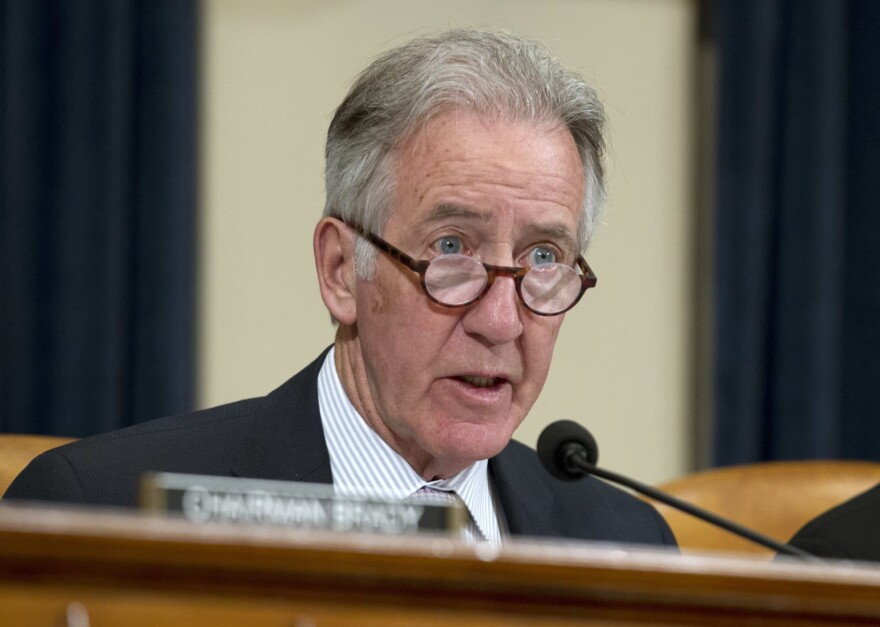Since the Democrats won back control of the House, Massachusetts Congressman Richard Neal has become one of the party’s most influential members as the chairman of the powerful Ways and Means Committee.
David Daley, the former executive editor of Salon.com and a longtime journalist and author, published an opinion piece this week in The Boston Globe about what he called Neal’s “high life” in Washington. It offered a stark portrait of how money, influence and power work in the nation’s capital.
“He essentially auctioned off access to himself, wining and dining lobbyists at these elite fundraisers,” Daley told WBUR. “In return, he pocketed hundreds of thousands of dollars of contributions, many from elite donors with valuable interests before his committee.”
Daley’s tough conclusion about Neal is supported by information provided by Neal himself to the Federal Election Commission.
According to FEC filings, right after he took the gavel on the Ways and Means Committee, Neal took in more than a half a million dollars. Much of that sum was comprised of corporate PAC money from a range of interests: health insurance, big Pharma and financial services, as well as from companies like Home Depot, Prudential and Toyota.
But what’s most striking is how he spent money to get that money.
The biggest share of spending was for entertainment, restaurants, hotels and fundraising consulting services. Neal spent tens of thousands of dollars on fancy dinners and posh events from Washington, D.C. to Florida to California — all to woo wealthy donors, who in turn gave Neal hundreds of thousands of dollars in contributions.
“It’s night after night,” said Daley. “… At all of the hottest steak houses and seafood places on Washington’s waterfront. It’s evenings in Manhattan, in which Neal stays at the finest luxury hotels. There’s travel through California, there’s travel through Texas. What there’s not is an awful lot of travel through Massachusetts’ 1st District, listening to constituents.”
Neal’s office did not return multiple calls, texts and emails sent by WBUR requesting comment on the congressman’s fundraising and campaign spending.
FEC documents show Neal raised and spent more campaign cash this year than anyone else in the Massachusetts delegation. Of the state’s seven House members, Congressman Joe Kennedy is an impressive fundraiser and accepts PAC money, but he came in a distant second to Neal on both accounts. And records show, in the first quarter, Kennedy spent virtually nothing on the kind of fancy fundraising events at which Neal excelled.
Daley, who’s been covering money in politics for a long time, said Neal represents an extreme case of pay-to-play politics.
“I have never seen FEC reports as stuffed with luxury hotels and fancy restaurants,” Daley said. “He took full advantage of this. This is everything that is wrong with the system on steroids.”
Paul Seamus Ryan, vice president for policy and litigation at the nonpartisan watchdog group Common Cause — which advocates for campaign finance reform — said while some may see Neal’s moves as extreme, he thinks it’s not uncommon.
“I understand Daley’s frustration. It’s not a good way to run democracy, but it is legal and it is quite common in my experience,” he said.
“Members of Congress hold all, or nearly all, of their fundraising events at posh locations,” Ryan added. “It is a seemingly enjoyable way to pad your own lifestyle if you’re a member of Congress.”
Rather than be outraged at Neal, Ryan said, focus it on a broken system that thwarts democracy.
“The big problem is that the average American cannot afford to pay $5,000 to attend a fancy dinner with a member of Congress,” he said. “It leaves most of America out in the cold — not having the same level of access and influence as wealthy people and special interests have.”
That can have real legislative consequences — or at least the appearance of such. Last month, for example, Neal championed legislation to reform the Internal Revenue Service. According to Neal, the law would provide protections for low-income taxpayers. But it also prohibits the IRS from ever offering a free tax-filing system for low-income Americans — which would have cut into the profits of tax prep giants like H&R Block. Among the companies to make a donation to Neal this year: H&R Block.
“This is essentially pay-for-play legalized corruption,” said Daley. “And it has to stop.”
Again, there’s not a shred of evidence that Neal has broken any laws. He’s just very good at using the current system to raise lots of money — not only for him, but for fellow Democrats.
The FEC filings show Neal is one of the top 10 contributors to the Democratic Congressional Campaign Committee, which is focused on electing Democrats to the House.
This article was originally published on WBUR.org.
Copyright 2019 WBUR






